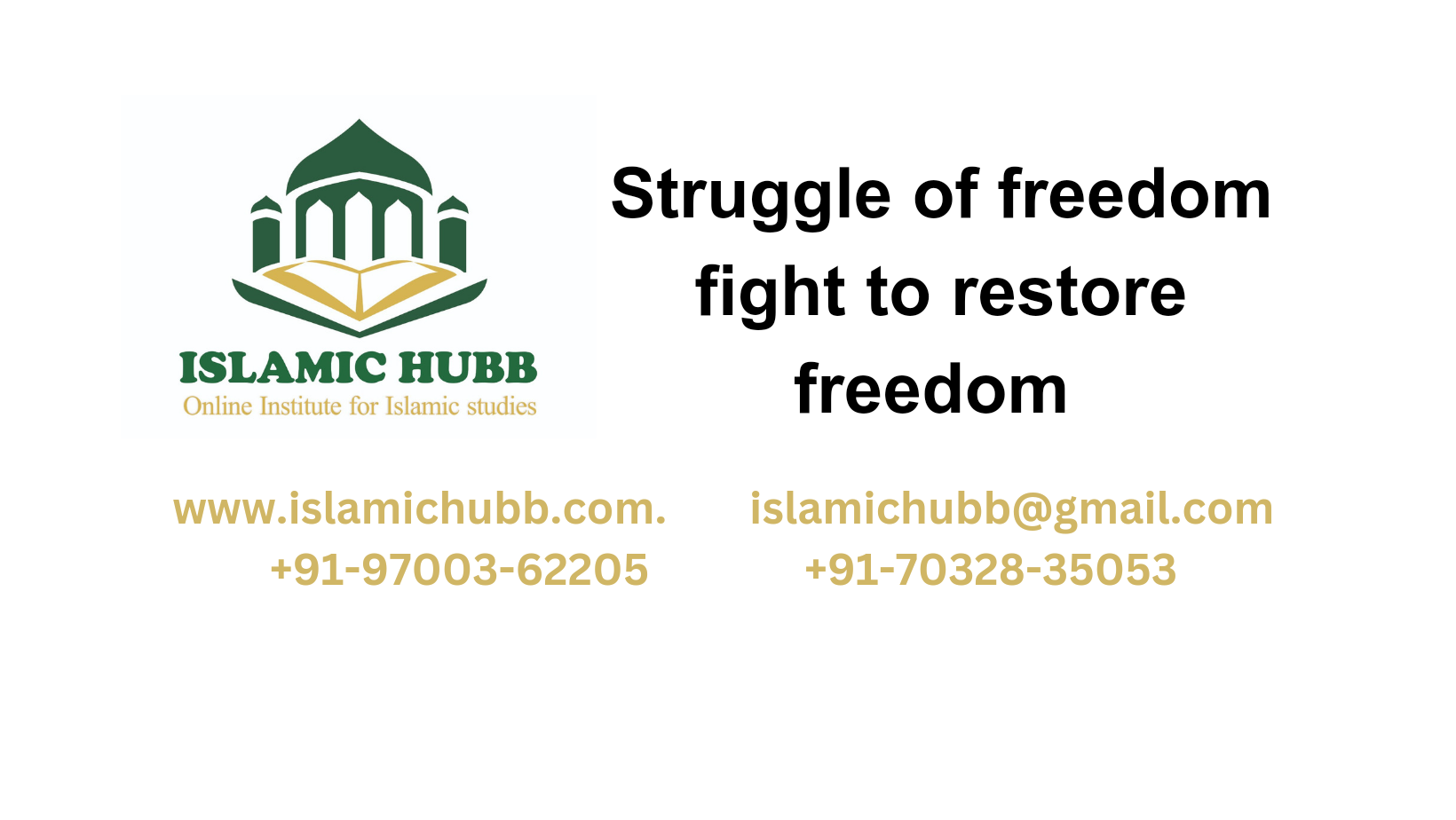Struggle of freedom fight to restore freedom
By: Mufti Syed Akif Tameem Saheb
Struggle of freedom fight to restore freedomHow many memories, how many emotions and how many longings are there from the occasion of August 15 and Independence Day, because hardly anyone can deny the fact that the era of slavery imposed on us by the Britishers. As a nation, if anyone has suffered the most loss, it is only the Muslim nation and there is no distance in acknowledging the fact that this period of one and a half hundred years is the religion of its own ignorance and luxury. Today, looking at the current situation of India and the plight of Muslims, it seems that the same history is repeating itself, not only in terms of its shortcomings, but also the results are unusually similar. Even more severe than that, referring to which respected teacher Sheikh Al-Hadith Hazrat Mufti Saeed Ahmad Sahib Palanpuri used to say that “in comparison to the problems that the Islamic nation of India is facing today, the struggle of the freedom war It can be more severe than that; because then the enemy was from outside and the people of the country were united against him, and today the enemy is from inside the house, so the people of the country were made to fight each other.
Today, more than 7 decades have passed since the liberation of this dear country; But again, due to our shortcomings (in which educational backwardness is particularly noteworthy), we have come to such a point that at this time, the challenge for us is not to achieve independence like our predecessors, but its survival and stability and the country’s democracy. The challenge of restoring the structure is certain, the Holy Qur’an commands the people of Islam to be full of strength and power in order to make sense of their life and life and to maintain their terror over other nations:
وَأَعِدُّواْ لَهُم مَّا ٱسۡتَطَعۡتُم مِّن قُوَّةٖ وَمِن رِّبَاطِ ٱلۡخَيۡلِ تُرۡهِبُونَ بِهِۦ عَدُوَّ ٱللَّهِ وَعَدُوَّكُمۡ وَءَاخَرِينَ مِن دُونِهِمۡ لَا تَعۡلَمُونَهُمُ ٱللَّهُ يَعۡلَمُهُمۡۚ وَمَا تُنفِقُواْ مِن شَيۡءٖ فِي سَبِيلِ ٱللَّهِ يُوَفَّ إِلَيۡكُمۡ وَأَنتُمۡ لَا تُظۡلَمُونَ
[ الأنفال: 60]
And nowadays, the easiest and biggest weapon for the Indian Muslims to achieve this desired strength and power is education.
And the fact is that the British would never have occupied this country if we were perfect and complete in every respect, religious and worldly, as well as invincible especially in the fields of education; Because at the time when Europe was on the rise of science and art, we were so far away from education, some on the basis of conspiratorial elements and some due to our own laziness, that finally the same weakness brought us the message of decline like the author of Rud Kausar. Sheikh Muhammad Ikram wrote: “Basically, the main reason for the fall of the government was the academic, mental and military shortcomings” (601).
According to the British historian, even until the beginning of the 19th century, the data of only one field of advocacy was that the ratio of Muslims in it was equal to the total ratio of Hindus and British, but after fifty years it happened that from 1853 to 1868 in this field A total of two hundred and forty Indians were admitted, of which two hundred and forty nine were Hindus and only one was a Muslim.
(Our Indian Muslims 146)
Now behind this backwardness as I mentioned there were two reasons.
One is that the official British government adopted many tactics to deprive the Muslims of education, as an English writer himself.
According to WW Hunter:
“We also deprived their (Muslims) way of education from the capital on which its survival depended, thereby destroying the educational system of Muslims and their educational institutions.” (Image of Ahmed 101)
While it should be noted that before the same British rule there were eighty thousand religious schools in Bengal alone, an English writer writes that “India is full of schools, there is one school for every thirty-one boys”.
Historians have written about Sindh that “there were four hundred colleges of various sciences and arts”.
In the entire history of India, the sciences, arts, science, philosophy, industry, and trade as a whole never developed so much as they did during the 200 years of Mughal rule.
Education in India under Muslim Rule (78)
And the second reason was our own shortcomings. Our kings and rulers were rapidly declining in their ability to conquer the country and their character and morals. It is surprising that on the one hand, a hard-working, far-sighted king like Aurangzeb sat on the throne of India, and on the other hand, the Mughal princes of the distant decadence, who, in the wake of sensual desires and sensual feelings, destroyed the entire nation of India and their religious and educational freedom.
Allama Iqbal had spoken the truth
میں تجھ کو بتاتا ہوں تقدیر امم کیا ہے
شمشیر و سناں اول طاؤس و رباب آخر
Even the recitation of Surah Yasin was forbidden in the Red Fort. And the thought of death and the hear after was strongly influenced by the indulgent nature of luxury
(History of the Decline of the Ummah (341))
However, on the basis of these laziness, the oppression of the English government continued to strengthen until in 1802, Ladlak attacked Delhi and arrested Shah Alam II and signed this treaty.
Shah Alam’s rule will be limited to the city of Qila and around Delhi Qutb Minar and the rest of the country will be dominated by the British and now the protection of the rights of Muslims will be the responsibility of the Company instead of King Salamat.
However, the purpose of slandering these causes of decline is that the same disease of ignorance has become the biggest challenge for us today. Even in this era of extraordinary technology, it is a sign of distance from the education of the Muslim nation that recently the results of intermediate students in Telangana came and the lowest percentage of those who succeeded were Muslims. To deal with this plight, the security and firmness of faith and belief, with stability and persistence on righteous deeds, wherever there is a need for political, social and economic development and construction, there is the need to educate yourself and your nation most of all. There is a need to strengthen, at that time there was a war for independence and today there is a struggle for the restoration of independence. When Hazrat Musa (peace be upon him) was being verbally honored by Allah, the Most High, and was being sent to his people, at that time, Allah gave him a miracle along with the Prophethood, that the staff in his hand. used to take the form of a snake; But at the time of the Prophet’s mission, he was not honored with such a charismatic miracle, but when he was being sent to instill the spirit of revolution and change in the Ummah, he was given a scientific miracle in the form of the Holy Quran. Granted, which began with the meaningful word Iqra, on this occasion, the Indian Muslim Ummah needs to pay special attention to education.
Hazrat Faqih al-Asr Maulana Khalid Saifullah Rahmani, president of the Muslim Personal Law Board, writes that “The way the scholars started the movement of religious madrasas, if they had removed the stigma of contemporary institutions in the religious environment, the map of this country would have been different today. Muslims would have been able to play a key role and Muslims would not have suffered from the weightlessness that they are suffering from today”. (He who used to sell medicine for the heart 85)
It is not necessary that all of us are qualified to establish a contemporary institutions and an Islamic school ; But we can and we need to do a lot to improve the educational quality of ourselves and our relatives.
May Allah سبحانه وتعالى bless us with success and give ability to act on it .
Ameen .




